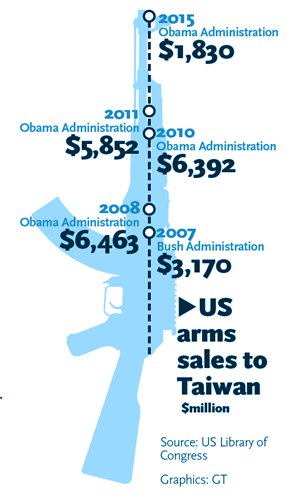

Analysts warn of 'irreversible damage' if arms sales to Taiwan rise

US President-elect Donald Trump's tweets about US arms sales after his protocol-breaking phone call with Taiwan's leader has spurred speculation that Trump may increase arms sales to the island, with Chinese analysts warning that the negative consequences would outweigh any profits.
Analysts also believe that the military gap between the Chinese mainland and Taiwan is too big to be filled by any US arms sales, and selling weapons to Taiwan is still viewed as an offensive political act from the US to interfere in China's domestic policy.
Taiwan leader Tsai Ing-wen on Friday spoke on the phone with Trump, offering her congratulations on his election victory, the first direct phone call between a US president-elect and a Taiwan leader since mainland and the US established diplomatic ties in 1979.
Trump also called Tsai "the President of Taiwan" in a tweet, adding "interesting how the US sells Taiwan billions of dollars of military equipment but I should not accept a congratulatory call."
Tricky subject
Yang Lixian, a researcher at the Institute of Taiwan Studies of the Chinese Academy of Social Sciences, told the Global Times said that it is possible that Trump would see economic benefits in increasing arms sales to Taiwan.
"The Taiwan question is one of the most sensitive and tricky subjects of the Sino-US relationship," Yang said, adding that if handled inappropriately, it will cause irreversible damage.
Yang said that the Chinese mainland should remain firm in its attitude to object to any US arms sales to Taiwan, and make preparations for any possible adjustment to these sales.
Peng Guangqian, a military strategist at the People's Liberation Army (PLA) Academy of Military Science, told the Global Times on Sunday that the defensive capability of the Chinese mainland has overwhelmingly surpassed Taiwan in the past 10 years.
"Nowadays, we can observe a hostile aircraft carrier any time, and the mainland would have the home advantage if a conflict breaks out in the Taiwan Straits today," Zhang Junshe, a senior researcher at the PLA Naval Military Studies Research Institute, told the Global Times.
US military exports to Taiwan are merely a political act to demonstrate US hegemony in Asia and is a sharp practice on the part of the US, Peng said.
"Taiwan has purchased low-quality and less-advanced US weaponry at an extremely high price," Peng said.
The US has not and will not sell top-notch weapons to Taiwan, and China's objection has also affected their weapons trade, he said.
"Sadly for Taiwan, even if Taiwan bought some high-tech weapons from the US, in some cases, they wouldn't even be able to see or touch the weapons, since the US doesn't trust Taiwan's military with protected secrets," Peng noted.
Military exchanges
According to the Taipei Times, Taiwan's "Ministry of Foreign Affairs" last week welcomed the call by the US Senate and House of Representatives for military exchanges between senior Taiwan and US officials in the US National Defense Authorization Act (NDAA) in 2017, expressing gratitude to the US Congress for its continuous efforts in promoting military cooperation between Taiwan and the US.
Even if Congress passes the act, the US president has the right to veto it, Peng said.
"However, the act will certainly disturb the Sino-US relationship if it's implemented," Peng said.
The US may not suspend its arms sales to Taiwan after Trump takes office, Li Fei, a professor with the Taiwan Research Institute at Xiamen University told the Global Times.
However, once the Sino-US relations are affected, the US will lose more than the profit they make out of the arms sales, Li noted.
 Fire brigade in Shanghai holds group wedding
Fire brigade in Shanghai holds group wedding Tourists enjoy ice sculptures in Datan Town, north China
Tourists enjoy ice sculptures in Datan Town, north China Sunset scenery of Dayan Pagoda in Xi'an
Sunset scenery of Dayan Pagoda in Xi'an Tourists have fun at scenic spot in Nanlong Town, NW China
Tourists have fun at scenic spot in Nanlong Town, NW China Harbin attracts tourists by making best use of ice in winter
Harbin attracts tourists by making best use of ice in winter In pics: FIS Alpine Ski Women's World Cup Slalom
In pics: FIS Alpine Ski Women's World Cup Slalom Black-necked cranes rest at reservoir in Lhunzhub County, Lhasa
Black-necked cranes rest at reservoir in Lhunzhub County, Lhasa China's FAST telescope will be available to foreign scientists in April
China's FAST telescope will be available to foreign scientists in April "She power" plays indispensable role in poverty alleviation
"She power" plays indispensable role in poverty alleviation Top 10 world news events of People's Daily in 2020
Top 10 world news events of People's Daily in 2020 Top 10 China news events of People's Daily in 2020
Top 10 China news events of People's Daily in 2020 Top 10 media buzzwords of 2020
Top 10 media buzzwords of 2020 Year-ender:10 major tourism stories of 2020
Year-ender:10 major tourism stories of 2020 No interference in Venezuelan issues
No interference in Venezuelan issues
 Biz prepares for trade spat
Biz prepares for trade spat
 Broadcasting Continent
Broadcasting Continent Australia wins Chinese CEOs as US loses
Australia wins Chinese CEOs as US loses